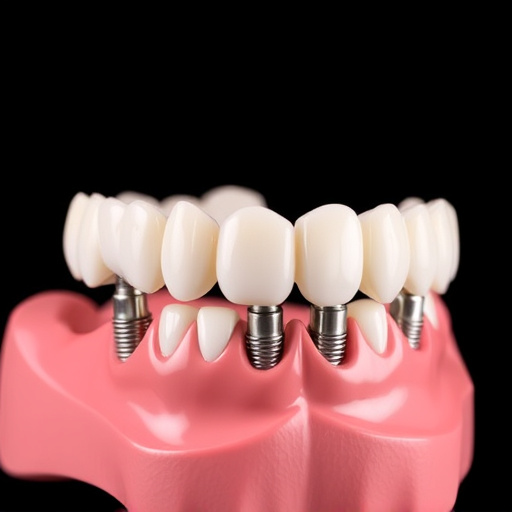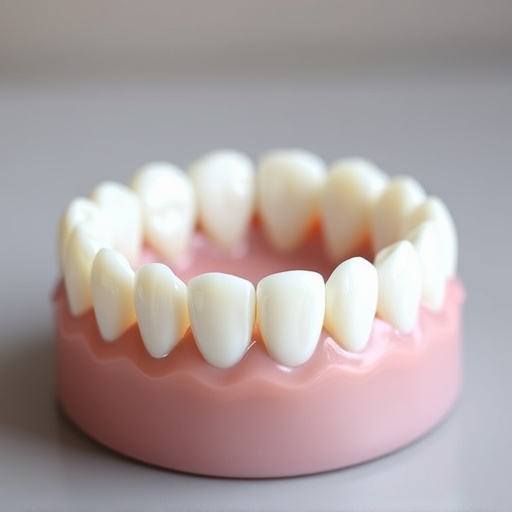Tooth sensitivity, caused by exposed roots due to enamel erosion or receding gums, can be treated effectively. Professional cleaning, gum care, and addressing dental issues like grinding or weakened fillings are key. Initial treatments include desensitizing toothpastes; more advanced options include clear aligners or dental fillings. Family dentistry practices offer personalized tooth sensitivity treatment for all ages.
Many people experience tooth sensitivity, especially when roots become exposed. This can lead to sharp pain upon eating or drinking something cold or hot. Dentists recommend various treatments for sensitive teeth, focusing on addressing the underlying causes of root exposure. Understanding these causes and available options is crucial for managing discomfort effectively. From desensitizing toothpaste to dental procedures, this guide explores effective tooth sensitivity treatment methods to restore comfort and confidence in your smile.
- Understanding Tooth Sensitivity and Exposed Roots
- Common Causes of Root Exposure and Sensitivity
- Effective Treatment Options for Sensitive Teeth
Understanding Tooth Sensitivity and Exposed Roots

Tooth sensitivity is a common concern that many individuals experience, often characterized by sharp pain or discomfort when consuming hot, cold, sweet, or acidic substances. This sensitivity can be caused by various factors, one of which is exposed roots. When the protective layers of enamel erode or wear down, it leaves the underlying dentin (a layer beneath the enamel) vulnerable and exposed to stimuli that trigger sensitivity. Exposed roots are often a result of receding gums, gum disease, excessive brushing, or tooth grinding.
The root surface lacks the hard enamel layer, making it more susceptible to decay and sensitivity. To address this issue, dentists recommend specific tooth sensitivity treatment options tailored to the underlying cause. This may include professional teeth cleaning to remove plaque and tartar buildup, comprehensive dental care to manage gum health, or in some cases, wisdom tooth removal if impacted teeth are contributing to root exposure.
Common Causes of Root Exposure and Sensitivity

Tooth sensitivity is a common issue that arises when the roots of teeth become exposed. This exposure can occur due to several factors, many of which are easily preventable with proper oral hygiene and care. One of the primary causes is recession of the gum line, often caused by brushing too hard or using a toothbrush with hard bristles. Age is also a factor; as we age, our gums naturally recede, exposing more of the root surface.
Additionally, tooth grinding or clenching, usually due to stress or sleep disorders, can wear down the enamel and expose roots. Cracked teeth or fillings that have become weakened over time can also lead to root exposure. In some cases, certain medical conditions or treatments like gum disease or tooth extractions might leave roots exposed, necessitating urgent dental care, such as emergency dental procedures including tooth repair or dental bonding, for relief from the sensitivity and discomfort.
Effective Treatment Options for Sensitive Teeth

When it comes to effective tooth sensitivity treatment, there are several options available to help alleviate discomfort and restore oral health. One common approach is using desensitizing toothpastes that contain ingredients like potassium nitrate or strontium chloride. These compounds block the transmission of sensory signals from the tooth’s surface to the nerve, reducing pain associated with sensitive teeth.
Additionally, dental professionals may recommend clear aligners or dental fillings as part of a comprehensive tooth sensitivity treatment plan. Clear aligners can be custom-made to fit snugly over your teeth, gently moving them into their ideal position while also protecting exposed roots. Dental fillings, on the other hand, can help rebuild damaged areas and provide additional protection for sensitive areas, offering both structural support and pain relief. Family dentistry practices often offer these services, ensuring that everyone in the family has access to effective tooth sensitivity treatment tailored to their needs.
Tooth sensitivity can significantly impact one’s quality of life, but with the right approach, it is manageable. Understanding the causes, such as root exposure due to gingival recession or tooth wear, is crucial for effective management. Dentists recommend various treatments, including desensitizing toothpastes, fluoride applications, and in severe cases, dental procedures like gum grafting. Choosing the appropriate tooth sensitivity treatment can greatly alleviate discomfort and restore oral confidence.














